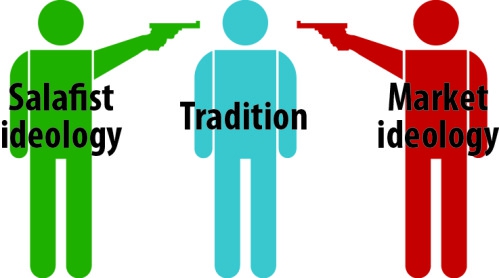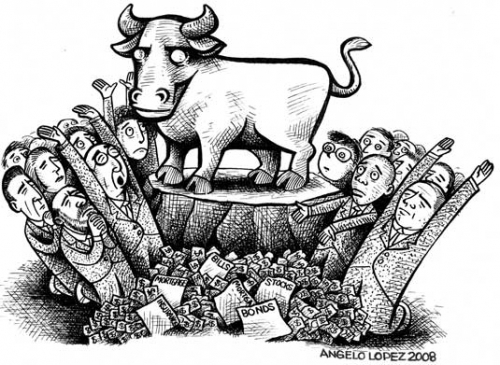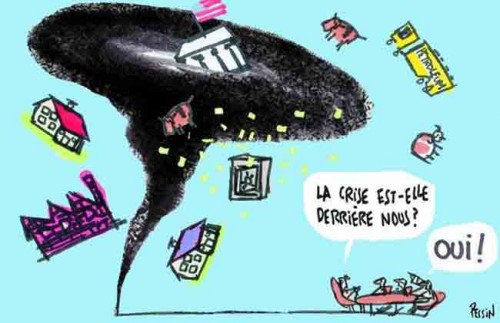
Jure Vujic:
The New Market Ideology
Conference about ideological tendencies in contemporary society, Zagreb, Croatia, december 2014.
"Ideological Tendencies” Gathered A Few Hundred Inquiries
The big hall of ‘Matica Hrvatska’ (MH) was packed on a Thursday 11th december with those whose attention had been drawn by the topic of a round table which had been organized by World Youth Alliance Croatia in cooperation with Politology Department of MH .
Ideological tendencies in contemporary society do not only relate to totalitarian regimes which naturally spring up when we talk about ideology as a commonly accepted term, said the head of Politology Department of MH, political scientist Jure Vujić who started the polemic. Market ideologists, thinks Vujić, brace the myth of continuous progress which as a goal has a fulfillment of some kind of lost paradise for which every man is yearning. They succeed in their means following a distorted human consciousness which holds that the progress is exclusively maintained by market development.
A viewpoint that science is the only means to the genuine knowledge about the world is what differs science from scientism, said prof. Stipe Kutleša, physicist and a philosopher, pointing to the snare to which modern science falls in. In the same manner as every ideology does not permit the existence of truth claims outside of her own system, some scientist do not think there is genuine knowledge apart of empirically verifiable one.
Professor Tomislav Kovač from the Faculty of Catholic Theology in Zagreb spoke about religious fundamentalism in the context of ideologies, which attracts the most attention in the public square. Albeit public recognition is generally restricted to fundamentalist acts of some Islamic fractions, the notion as it is has its roots in American Protestantism, which had, two centuries ago, brought forth few groups which were against the modernization and secularization of society. In that sense, Kovač holds, we shall rather speak in plural – religious fundamentalisms. They start off from principally positive things, stoping the overwhelming secularization of society, but the way they act takes the ideological forms.
When it comes to neo-liberalism, dr. sc. Neven Šimac again reflected upon market component and warned, whilst presenting a survey of modern economical crisis, that in mentality which justifies indebtedness as an effect of stance that we ought to be greedy, crisis is being understood as “normal”.
Young doctoral student , Marina Katinić, appeared with the feminism topic, citing the works of 16-th century male Croatian novelists. Katinić tried to define, using the historical review, settings in modern feminism movements which have ideological tendencies. She emphasized cyber-feminism as a means to the end in redefining gender using cyber space.
After lectures, discussion emerged. Judging by the questions posed, we can conclude that the topic audience was the most interested in was neo-liberalism. Lecturers agreed that “mercantile logic unifies all critically analyzed ideologies”.

Hrvoje Vargić, World Youth Alliance Croatia’s Vice President, M.A. in Economics and philosophy student moderated the event. The entire event was of humanitarian character, hence participants, whilst the admission was free, could contribute to youngsters living in Home for orphans at Vrhovac, Zagreb.
World Youth Alliance Croatia is a branch of the global organization World Youth Alliance which is dedicated to promoting and defending human dignity and solidarity among youth, by means of educational and cultural content and youth impact on public policies. WYA has been in Croatia for little over a year. In that time, several cultural and educational events have been carried out.
Jure Vujic :
The new market ideology
(memory-speech)
The market is everyday life became unquestionable paradigm and part of our mental habit. As a term that represents the place where the supply and demand, the market has also become part of our social imaginary that runs through advertisements, phones, internet, and the ubiquity of talking about the status of socio-political dogma which imperatively associated democracy with a market system. But despite being a market mechanism to regulate relations between buyer and seller (and there is nothing objectionable), it is highly questionable paradigm when it became the dominant model of social, political and cultural organization. We should not forget that the market always involves the quantification of value, services and goods, and that, as such, impose ideological terms criterion and inevitably reduces all human dimension to the utilitarian equation. In fact the market, as pointed out by economist Roger Guesnerie, "great abstraction", which colonized all other cultural and philosophical dimensions of life. The Hungarian-American economist Karl Polanyi rightly distinguishes between the "market society" from "market economy". The market economy is formed when strategic public wealth, and there is talk about the work, land and natural resources, are destined for sale. The market economy in turn becomes a market society when the market dictates its legality social and political institutions. Polanyi in this case speaks of a society that is built into the economy, although the economy should be integrated into society. In this way, under the pressure of conceptual confusion democracy itself became a "market" and thus should replace all other forms of social democracy.
It is true that the market has never been independent of society. Smith's laissez-faire dogma fact is fiction and not a natural category. The market never establishes itself, because free markets never have existed if left to market anarchy and spontaneous course of things. The Company provides and restricts his place, and when the market disappeared, will not be forgotten and society, which means that market disappeared just as the organ of economic autoregulation. Another prejudice widespread belief that the market determines and understood democracy as though the market really comes to the pluralism of social life, it should be noted that it is very well adapted to each other form of political regime and order. It is now scientifically accepted that the market is not the only pattern of democracy, and Polanyi believes that fascism is a direct result of dysfunction of market societies. The greatest weakness of the market is that it is not tied to any parent ethical norm, and sociologist Jean Gadrey points out that what actually impoverishes social relations based on reciprocity and solidarity. Moreover, Polanyi points out, under the trade policy of the poor can "starve".
The Enlightenment's sources of market ideology
To better understand this paradigm change (transition from a market economy to a market society) should first determine which are the philosophical roots of the market and point to his close connection with the liberal philosophy of the Enlightenment. It could be said that the paradigm of economic growth from the eighties replaced paradigm of sustainable growth, while the advent of neo-liberalism ideology of the market is becoming a new global paradigm that humanity should usher in a new golden age, the lost paradise "welfare society". This is a new secular religion that through competition and material success actually offers a new salvation and redemption. The market is as a social model has undergone fate similar to that of reason and rationality, which are mutated during the Enlightenment of human cognitive powers of the instrument calculated utilitarianism which calculate the most economical application of resources for a particular purpose. Instrumental market as an interchange framework and its idolatry turned into a kind of epistemological goal (not as a framework trade) that the law of supply and demand applies to all social, cultural and political segments of human society. Market neoliberal global uniformisa- and fetishization of the free market (free market) on a planetary scale is actually an offshoot of a postmodern utopia unified humanity which is found in Tomasso Campanella, Thomas Moore, Kant, Fourier and Saint-Simon, and later in the Wilsonian ideals of world rule. In this sense, the global unified market should unite mankind in planetary consumer society in which should disappear ethnic and religious conflicts. The ideology of the market, therefore, is the main engine of spreading the ideology of sameness.
Liberal economic and political ideology was created with the philosophy of the Enlightenment, and the economic, monetary and political dimension of the market can not be reviewed or evaluated outside the framework of understanding the world and society based on the Enlightenment, ie the piLiberalosophy of John Locke, David Hume, Mandeville ("private vices are the source of virtues "), Voltaire, Adam Smith and others. It is no coincidence that identities are formed as part of the Enlightenment and become problematic in the modern era. And that in turn means that the holder of a modern changes that directly damage identities. This change is primarily related to the growth of individualism, whose origins go back to the philosopher Descartes. For Descartes, there are "sublimation of man", as the author states in advocating a kind of "ontological loneliness", where a man now do not need any more communities. One of the consequences of political atomism which appears in the 17th century, especially in the theories of the social contract, as well as reducing the individual to socially isolated and replaceable atom.
A society without institutions
The ideology of the market belongs to constructivist conceptual matrix that does not recognize the reality of the natural and organic base of society and as such stems from the mechanical conception of society that are opposed to the idea of the community. The ideology of liberalism, which touched economy somewhat during the 19th century and the advent of modern spread its epistemological impact on the field of social sciences and humanities. The radicalization of the new liberal political philosophy after the First and Second World War led to the legacy of economic and social democracy (Catholic social teaching). There is the vision of a world reduced to a market that promotes a new cultural model. This new liberal "vision of the world" is gradually incline the Social Democrats, the right and left liberals, Democrats and part of the labor unions. In parallel with the rise of monetarism seventies created a new tendency in the form of the liberal faction, which is based on microeconomic principles of synthesis that wants to integrate "the overall social and human behavior". Representative current and Gary Becker, who in economic theory introduces traditional sociological elements: racial and sexual discrimination, education, consumption and distribution of time and family. Its synthesis is based on two pillars: market equilibrium hypothesis and maximize profits.
Becker's approach radicalizes liberal thesis in relation to the neoclassical school, which accepts the possibility of dysfunction of the market because the market at Becker ubiquitous phenomenon. This understanding of the market advocates the application of instrumental rationality. According to him all the individual and social behavior deductively derived from the same rationality and the individual is abstract being no liability in relation to community and others. Therefore, every social interaction determines the economic interest. Such flow products postulate that paved the way neoliberal era: it is possible to establish a society without institutions. Family, businesses, interest groups, states and schools are just derivatives of interest games of different actors, and every form of historical genesis and sedimentation, which explains the development is considered from this perspective useless. The symbolic narrative repertoire of world views, perceptions, traditions and culture thrown in favor of maximizing profits, and microeconomics becomes a social link and the main principle. These are difficult and led to further economization of all the other dimensions of human existence. The neoliberal school even criticized Milton Freedman or Friedrich Hayek that are not radical enough on the criticism of state interventionism as to her state should completely disappear and give way to the market. Michel Foucault is so lucid that neoliberalism is gradually becoming a "technique of government economic and social policy that expands the market mechanisms and laws to all other segments".
Market and culture
The new libertarian vision of society promotes the idea of the market as an ideal model of social relations, and the ubiquity of market logic is colonized and the sphere of culture. Indeed, his commercialization and industrialization of culture, but do need to point out that the man as a social being in its entirety has become a mechanism to renew logic instrumentalized reason, the logic of profit and interest. Market promotes ideology through visual culture while trying to win over society and individuals because it denies other forms of symbolic exchange and social relations based on ritual dimensions and other cultural codes. The concept of network markets was coined by Robert Leroy to describe the market in the form of a network that connects the whole society in which it is difficult to identify what the Economic and what the cultural sphere. Capitalism has gradually adapted to such cultural dimension of the market and in its contemporary ludic and cognitive form of manipulating consumption. Modern form of capitalism is no longer, as in the 19th century, subject only to market forces in the sphere of production, but now is a part of private life in the sphere of consumption, ideas, art, education and private life. Created by a new form of fatalistic resignation that assumes that the capitalist system is invariable and that encourages a kind of escapism in the form of the pleasures of sex, drugs and can be derived from this model of one-dimensional man. What is visible in the political arena is that the ideology of the market and neoliberalism shook the entire ideological tradition and structure of the Left and the Right, social democracy, Christian democracy and communist tradition and that prevented the emergence of alternative non-market social and economic model. It could, finally, to say that the historical irony that Marxist materialist homo economicus project actually leads to the end and improved roller economization of neoliberal ideology of the market.
Područje privitaka
Pregled privitka IdeologicalTendenciesGatheredAFewHundredInquirers.png
IdeologicalTendenciesGatheredAFewHundredInquirers.png
482 KB






 del.icio.us
del.icio.us
 Digg
Digg